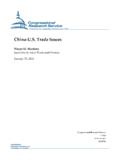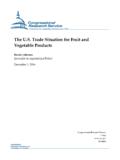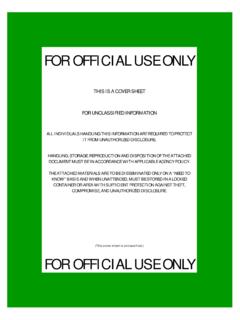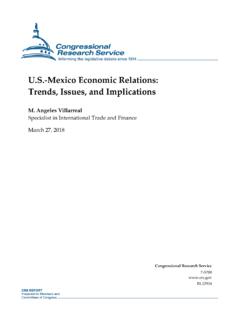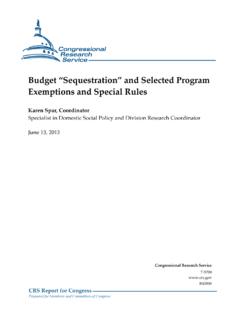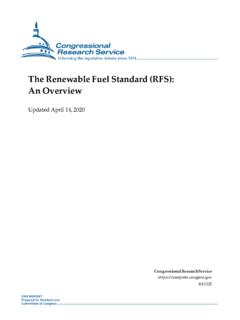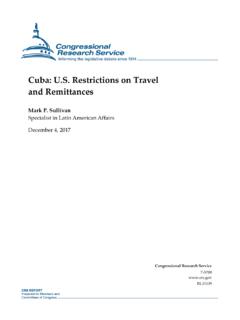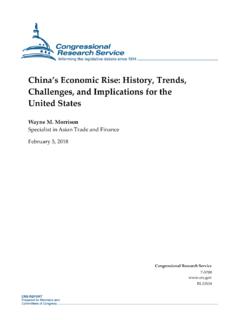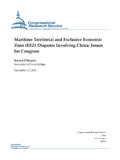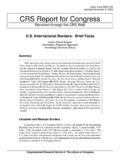Transcription of Social Security: Cost-of-Living Adjustments
1 Social security : Cost-of-Living Adjustments Julie M. Whittaker Specialist in Income security October 26, 2017 Congressional Research Service 7-5700 94-803 Social security : Cost-of-Living Adjustments Congressional Research Service Summary To compensate for the effects of inflation, Social security recipients usually receive an annual Cost-of-Living adjustment (COLA). According to parameters outlined in the Social security Act (42 415(i)), a COLA is payable in January 2018. For a retired worker receiving the average benefit amount of $1,377, the COLA will result in a $27 increase in Social security benefits (for a total of $1,404). Social security COLAs are based on changes in the Consumer Price Index for Urban Wage Earners and Clerical Workers (CPI-W), updated monthly by the Department of Labor s Bureau of Labor Statistics (BLS).
2 The COLA equals the growth, if any, in the index from the highest third calendar quarter average CPI-W recorded (most often, from the previous year) to the average CPI-W for the third calendar quarter of the current year. The COLA becomes effective in December of the current year and is payable in January of the following year. ( Social security payments always reflect the benefits due for the preceding month.) If there is no percentage increase in the CPI-W between the measuring periods, no COLA is payable. No COLA was payable in January 2010, January 2011, or in January 2016. The January 2018 COLA will also be applied to Supplemental security Income (SSI) and railroad retirement tier 1 benefits, among other changes in the Social security program. Although COLAs under the federal Civil Service Retirement System (CSRS) and the federal military retirement program are not triggered directly by the Social security COLA, these programs use the same measuring period and formula for computing their COLAs.
3 As a result, their recipients similarly will receive a similar COLA payable in 2018. Social security : Cost-of-Living Adjustments Congressional Research Service Contents How Is the Social security COLA Calculated? .. 1 What Is the COLA to Be Paid in January 2018? .. 1 Scenario in Which No COLA Is Payable .. 2 Medicare Part B and a Very Small or No COLA .. 3 What Is Affected Besides Social security Benefits? .. 4 Other Programs .. 4 Program Elements .. 4 Tables Table 1. Determination of a Potential Social security COLA, January 2018 .. 1 Table 2. Average CPI-W for the Third Quarter, 2007-2017 .. 3 Table 3. History of Social security Cost-of-Living Adjustments .. 6 Contacts Author Contact Information .. 7 Acknowledgments .. 7 Social security : Cost-of-Living Adjustments Congressional Research Service 1 How Is the Social security COLA Calculated?
4 An automatic annual Social security benefit increase is intended to reflect the rise in the cost of living over a one-year period. The Consumer Price Index for Urban Wage Earners and Clerical Workers (CPI-W), updated monthly by the Bureau of Labor Statistics (BLS), is the measure that can trigger a benefit The Social security Cost-of-Living adjustment (COLA) is based on the growth in the index from the highest third calendar quarter average CPI-W recorded (most often, from the previous year) to the average CPI-W for the third calendar quarter of the current year. If the CPI-W triggers a COLA, the COLA becomes effective in December of the current year and is payable in January of the following year. ( Social security payments always reflect the benefits due for the preceding month.) A COLA trigger mechanism was first adopted in 92-603, the Social security Amendments of 1972, and triggered COLAs were first payable in 1975.
5 Prior to 1975, Congress sporadically approved COLAs through the adoption of What Is the COLA to Be Paid in January 2018? On October 13, 2017, the Social security Administration (SSA) announced that a Social security COLA would be paid in January The BLS release of the September 2017 CPI-W on that day made possible the comparison of the two July-September sets of CPI-W data needed to compute the COLA (one for 2016 and another for 2017). Table 1 shows how the determination for a January 2018 COLA is computed under procedures set forth in Section 215(i) of the Social security Act. Table 1. Determination of a Potential Social security COLA, January 2018 CPI-W Index Points July 2016 August 2016 September 2016 Average for Third Quarter of 2016 (rounded to the nearest one-thousandth of a point): July 2017 August 2017 September 2017 Average for Third Quarter of 2017 (rounded to the nearest one-thousandth of a point): Percentage increase or decrease from the third quarter average for 2016 to the third quarter average for 2017 and multiplied by 100% (rounded to the nearest one-tenth of 1% for the final application, when positive, as required by law): (( ) ) * 100%= Social security Cost-of-Living adjustment (zero if the percentage change is negative).
6 1 For more information on using the CPI-W and considering an alternate inflation index, see CRS Report R43363, Alternative Inflation Measures for the Social security Cost-of-Living adjustment (COLA). 2 The COLA is based on price growth to retain the purchasing power of monthly benefits over time for current beneficiaries. The initial computation of the base benefit amount for new beneficiaries uses a formula that is linked to overall wage growth. For more information, see CRS Report R42035, Social security Primer. 3 Social security Administration (SSA), Social security Announces Percent Benefit Increase for 2018, press release, October 13, 2017, at #/post/10-2017-1. The Bureau of Labor Statistics announced the CPI-W figure for September 2016, the final month of the third quarter measuring period.
7 Social security : Cost-of-Living Adjustments Congressional Research Service 2 Source: Bureau of Labor Statistics data series for the Consumer Price Index for Urban Wage Earners and Clerical Workers (CPI-W) for 2016 and 2017. Note: The reference base period for the CPI-W is 1982-1984 ( , the period when the index equaled 100). Scenario in Which No COLA Is Payable Since automatic Social security benefit COLAs began in 1975, there have been three years in which no COLA was payable: 2010, 2011, and 2016. The Social security Act specifies that a COLA is payable automatically if the average CPI-W for the third quarter of the current year is higher than the highest average CPI-W for the third quarter of past years, which is called the Cost-of-Living computation quarter. From 1975, when this provision became effective, to 2008, a new Cost-of-Living computation quarter was established in each subsequent year, which triggered the payment of a COLA each year.
8 If the average CPI-W for the third quarter of the current year is equal to or less than the average CPI-W for the Cost-of-Living computation quarter, no COLA is payable. For example, the average CPI-W for the third quarter of 2009 was less than the average CPI-W for the third quarter of 2008 ( and , respectively). As a result, an automatic COLA in January 2010 was not triggered and the third quarter of 2008 remained the Cost-of-Living computation quarter ( , the benchmark) used to determine if a COLA would be payable in January Though the average CPI-W for the third quarter of 2010 ( ) was greater than the average CPI-W for the third quarter of 2009, it did not exceed the average CPI-W for the third quarter of 2008. The third quarter of 2008 remained the Cost-of-Living computation quarter for at least one more year and a COLA was not payable in January 2011.
9 When the average CPI-W for the third quarter of 2011 ( ) exceeded that for 2008, a 2012 COLA was triggered and the third quarter of 2011 became the Cost-of-Living computation quarter. New Cost-of-Living computation quarters were subsequently established in each year from 2012 to 2014, when the average CPI-W for the third quarter of 2012, 2013, and 2014 exceeded that for the third quarter of each preceding year. Similarly, since the average CPI-W for the third quarter of 2015 ( ) did not exceed that of 2014 ( ), no COLA was paid in January 2016. Thus, for the COLA payable beginning in January 2017, the Cost-of-Living computation benchmark quarter remained the third quarter of 2014 where it was compared with the average CPI-W for the third quarter of See Table 2 for a recent history of average CPI-W performance for the third calendar quarter, and how that has affected changes to the Cost-of-Living computation quarter and the triggering of COLAs in some years.
10 4 Section 215(i) of the Social security Act specifies that no COLA is payable in subsequent years until the average CPI-W for the third quarter of the current year is greater than that for the last Cost-of-Living computation quarter. 5 The Congressional Budget Office (CBO) and the trustees for the Social security trust funds both project continued annual COLAs beyond 2017. For more information, see CBO, Social security Old-Age and Survivors Insurance Baseline Projections, June 2017, at , p. 2, and Social security Administration (SSA), The 2017 Annual Report of the Board of Trustees of the Federal Old-Age and Survivors Insurance and the Disability Insurance Trust Funds, section on program specific assumptions and methods, July 2017, at , Table Social security : Cost-of-Living Adjustments Congressional Research Service 3 Table 2.
